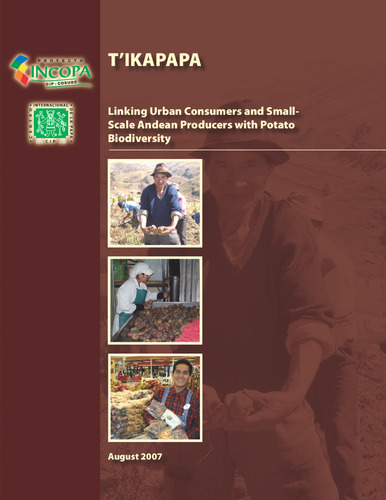Peruvian highlands have a vast potato
biodiversity, which is not being exploited
adequately and on a sustainable basis.
Most varieties of native potatoes are unknown,
and although it is not possible to prove their
erosion, it is possible to confirm their production
stagnation and their latent risk to disappear.
The INCOPA Project of the International Potato
Center (CIP) is working in this context. Its work is
oriented to develop actions to identify and exploit
new market opportunities, taking advantage
of native potatoes biodiversity and linking
producers with other potato market chain actors
in a better way. In particular, it seeks to develop
and implement participatory mechanisms and
shareholder platforms to generate commercial,
technological and institutional innovations
among different potato chain actors and under a
severe demand approach.
The idea is to exploit the comparative advantages
of Peruvian potato (given by geographical
location) and add factors to develop competitive
advantages (differentiation and added value of
the product).
The Participatory Market Chain Approach
(PMCA) is the tool being used to achieve this goal
oriented to involve all chain actors to generate
innovations to improve potato competitiveness.
As a result of this work, the T’ikapapa product
(meaning Potato Flower in Quechua) has been
developed. T’ikapapa is the first commercial
brand supporting native potatoes sale under
strict quality standards.
In this sense, this document summarizes the
concepts on the product development presented
in the 2005 Business Creativity Award, where it
won the first place in the Food Category (this
award is promoted by the Peruvian University of
Applied Sciences – UPC, El Comercio newspaper,
radio station RPP and ATV television network).
The jury considered that: “T’ikapapa allows
linking urban consumers and Andean producers
with potato biodiversity to revalue the culinary
heritage, exploiting and preserving the rich
versatility of Peruvian potato and generating
sustainable businesses for small scale highland
producers and committed companies”1.
The INCOPA Project is coordinated by the
International Potato Center (CIP), funded by the
Swiss Agency for Development and Cooperation
(SDC) and implemented jointly with public
and private partners in Lima, Huanuco, Puno,
Apurimac and Huancavelica.
T’ikapapa: Linking Urban Consumers and Small Andean Producers with Potato Biodiversity
Citation: Ordinola, M., Bernet, T., Manrique, K. (2007). T’ikapapa: Linking Urban Consumers and Small Andean Producers with Potato Biodiversity. International Potato Center. Lima, Peru. 55 pp.
2022-01-26
BIODIVERSITY FOR THE FUTURE, POTATO AGRI-FOOD SYSTEMS, POTATOES
SOUTH AMERICA
PERU
book

